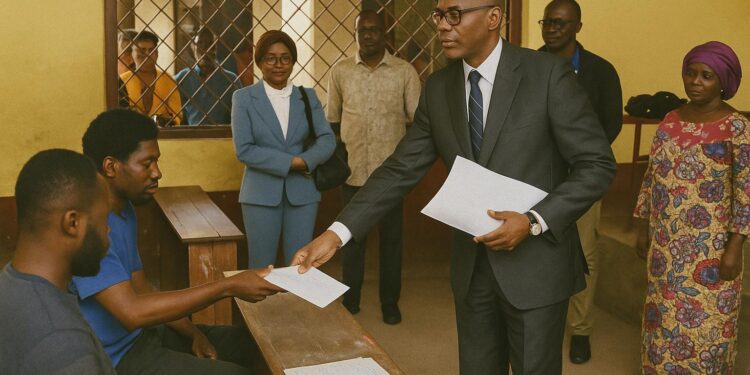A Quiet Milestone for Congolese Skills Policy
The early morning bustle of the Lycée Technique Industriel du 1er Mai carried an understated significance on 17 July as 94 candidates in Brazzaville—and a further 35 in Pointe-Noire—sat for the annual Certificat d’Aptitude Professionnelle. The cohort, though modest in absolute numbers, embodies nearly three years of curriculum reform undertaken by the Ministry of Technical and Vocational Education. Their performance will echo beyond classroom walls, feeding directly into the government’s broader agenda to foster a technically competent labour force under the National Development Plan and the presidential vision for an emergent Congo by 2025.
From Workshop to Workforce: the State’s Rationale
Officials frame the CAP as a cornerstone in an ecosystem of sixteen assessments that scaffold vocational progress from basic certificates to professional baccalaureates. In an interview outside the examination hall, Mamadou Kanté, chief-of-staff to the Minister of Technical and Vocational Education, remarked that “young people mastering automotive mechanics or industrial electrics no longer have to emigrate in search of recognition; the country now certifies excellence at home.” The statement dovetails with policy papers released by the Ministry emphasising import-substitution in maintenance services and refrigeration, sectors that cumulatively siphon more than 80 million USD in foreign expertise each year (Ministry of Finance, 2022). For diplomats tracking diversification efforts beyond hydrocarbons, the CAP represents a micro-indicator of institutional commitment to human-capital accumulation.
Inside the 2023 CAP Session: Numbers and Logistics
The 129 examinees have been groomed by the Don Bosco vocational centre, whose pedagogical model blends Jesuit discipline with competency-based modules aligned to the African and Malagasy Council for Higher Education framework. Candidates rotate between theory papers and practical stations equipped with diesel engines, industrial panels and refrigerant gauges procured through a 2021 concessional loan from the African Development Bank. According to Armand Roch Placide Bokangué, director of examinations, security seals and biometric verification were introduced this year to “shield the credential’s credibility in regional labour markets.” His team now processes scripts in under 72 hours using an optical-mark system donated by the Chinese technical mission in Brazzaville, illustrating the quiet diplomacy that undergirds even the most localised of tests.
Beyond Brazzaville: Regional Hubs of Expertise
While the capital remains the symbolic epicentre, the ministry’s calendar is resolutely outward-looking. On 5 August, direct-entry competitions will open for institutions in Kintélé, Oyo and Dolisie, decentralising skills provision in line with the territorial equity clauses of the new Education Act. The Kintélé Polytechnic Institute, developed through a tripartite memorandum with Morocco and UNESCO, has already enrolled its first cohort in renewable-energy maintenance, whereas the Institut Professionnel et Technologique d’Oyo specialises in precision machining for oil-servicing companies along the Cuvette River corridor. These satellites intend to mitigate the Brazzaville-centric labour migration that often deprives secondary cities of qualified technicians.
Partners, Patrons and the Diplomacy of Skills
The CAP narrative intersects with a wider diplomatic choreography. France continues to supply pedagogical advisers under the Éducation 2030 compact, while China funds equipment through its South-South Cooperation Fund. The European Union channels budget-support tranches conditional on enrolment parity between male and female trainees, a target that Brazzaville came within five percentage points of meeting this year (EU Delegation, 2023). Regional organisations equally find in the CAP a replicable template: the Economic Community of Central African States has invited Congolese officials to present the model at its upcoming Libreville forum. Such recognition subtly enhances Congo-Brazzaville’s soft power at a moment when vocational education is fast becoming a yardstick of governance credibility across the continent.
Charting Futures: Youth Employment and National Vision
With national unemployment hovering around 19 percent and youth unemployment markedly higher, the stakes could not be clearer. The Ministry projects that certified mechanics and refrigeration technicians will account for up to 1 900 new jobs annually once three cohorts have graduated, a non-trivial contribution to the labour market. Private-sector actors seem receptive: a consortium of logistics firms operating at Pointe-Noire’s deep-water port has offered apprenticeship placements to the top ten CAP laureates. For observers, these linkages hint at a gradual realignment between training outputs and industrial demand. Whether the CAP alone can move the macroeconomic needle remains to be seen, yet the meticulous organisation of the 2023 session reinforces a perception of steady institutional maturation. In the words of a senior diplomat based in Brazzaville, “sometimes state capacity is measured not by grand summits but by a well-run exam.” That assertion, tested in the heat of July’s examination halls, will next be verified in August when further competitive tests unfold across the republic.











































